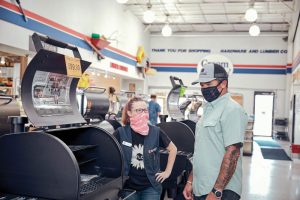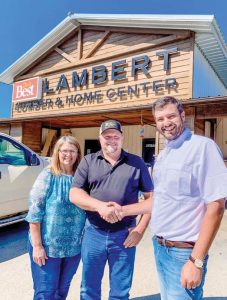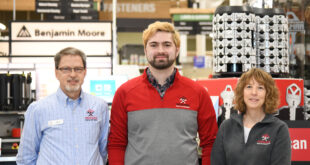There is no doubt we are in an era of consolidation among independent home improvement retailers. Recent research from the North American Retail Hardware Association (NRHA) clearly shows a trend toward fewer owners owning more stores. Accompanying this trend has been the growth of retail holding companies, unencumbered by geographic boundaries, looking to expand their retail presence and apply greater economies of scale to the operation of locally branded home improvement retail.
Enter Nation’s Best.
Nation’s Best is a retail holding company based in Dallas and run by Chris Miller, the former head of Parker’s Building Supply, one of the largest LBM chains in Texas.
Since forming in 2019, Nation’s Best has announced several acquisitions of independent home improvement businesses around the country, most recently acquiring Hall’s Hardware in Florida and bringing the operation’s total store count to 10.

The company expects two additional divisions will join the Nation’s Best family by the end of the year, bringing the store count to 20. It was recently announced that Nation’s Best has entered into a joint venture partnership with Do it Best to continue fueling its momentum.
Hardware Retailing recently talked to Miller for an exclusive interview to discuss the emergence of Nation’s Best and his plans for how the operation can continue on its growth path.
Hardware Retailing (HR): Tell us a little bit about your background and how that led you to your position with Nation’s Best?
Chris Miller (CM): I started almost 15 years ago with Parker Lumber. I had the opportunity as a young man to move back to Beaumont, Texas, and team up with Scott Parker, who was an industry leader. He sold the business to Lanoga and was reacquiring 10 units when I joined him. We started with those 10 locations and now it sits with over 30 locations throughout Texas, California and North Carolina. For me, just the opportunity to work with Scott and having him as such a strong mentor in business and in life was an incredible opportunity. I’d really say that was the catalyst for my growth. Under Scott, I got to learn how to incorporate best practices from each location across an entire operation.
Scott is a merchant at heart and he taught me the retail business, management and my first real experience into the world of acquisitions.
In 2015, when Scott ultimately sold the business to US LBM, I had a chance to work within a larger, corporate environment, and this experience brought a new scope of accountability to my position and also a broader use of metrics to run a business than I had seen before. When I was working with Parker Lumber, I was helping customers, mixing paint and getting on the floor, really learning the nuts and bolts of the business. And then with US LBM, I was working at a more strategic level and managing multiple locations across the country. These two things really prepared me for what we are doing today with Nation’s Best.
“This experience brought a new scope of accountability to my position and also a broader use of metrics to run a business than I had seen before.”
HR: How did Nation’s Best develop?
CM: The idea came as we traveled around the country and noticed there are definitely succession issues out there, but there are also other owners who just want to minimize risk and take their chips off the table. We also noticed that it is an extremely fragmented industry, and some of the smaller independents needed capital and additional experience to help them stay relevant and grow.
All of these factors create a great opportunity for a holding company like Nation’s Best to find opportunities and make the best even better. With independents fighting the big boxes and larger national companies, we can continue to leverage and partner with local businesses and keep them autonomous while sharing best practices and strengths to create economies of scale like the big boxes have. I think for local home improvement stores to continue to be relevant and compete, they must be part of a larger organization with more scale, like what we have with Do it Best.
HR: Explain what Nation’s Best is and tell us some of your goals.
CM: The goal is, as the name states, to become a national company that comprises best-in-class local market home improvement retailers with great reputations, known for exceptional customer service and community involvement.
The goal is to grow a solid business into the future with no private equity at play. With Nation’s Best, there are no capital return requirements in some short amount of time. This is really a long-term strategic play. I want to create a company that’s known for its mission statement of treating others the way you want to be treated. I know that might sound cliche, but if you treat your employees, customers and vendors the way you want to be treated, you will be successful and sleep better at night. We want to do this methodically and put our businesses on a continued path to growth.
HR: Where do you see Nation’s Best fitting in the independent home improvement retail channel?
CM: I really see it as a unique fit. There are a few other companies that might be considered similar to ours, but I look at Nation’s Best as being a really unique piece to the channel.
We are a growth-oriented solution for home improvement companies nationwide that care about their businesses and their communities and want to see their businesses go to the next level.
Nation’s Best started as a way to provide a succession opportunity for owners. The majority of the businesses we are looking at are small chains of home centers and hardware stores. These are operators who have good businesses but need a path to succession.
HR: How does the process start?
CM: It’s our goal to help these owners move into their succession plan and keep the business and brand they built alive and growing. We will work with an owner even if the deal won’t start this year. We can begin having those talks and help them along the path to succession. So we can start talking and working with them through the succession process, and we have the resources to help through that transition.
So if the owner says, “I don’t want to sell for two to three years,” then we can work with the owner and say, “Your business would look even more attractive to us if you do X, Y and Z.” Then we can work with them throughout the process. This is a model that hasn’t been pursued in the industry at this point. The majority of the consolidators out there are either private equity-backed or operate as a wholly owned subsidiary of a distributor, so Nation’s Best offers a different and unique opportunity.
HR: How do you see Nation’s Best growing throughout the balance of the year?
CM: Where we sit today, I would say that the four divisions and 10 locations we have acquired within the last year are stabilized and doing very well. That said, while our recent acquisitions have been in Florida, Texas and Oklahoma, we are open to constructive discussions with store owners in other parts of the country, some of whom we are in discussions with right now. We expect continued positive traction in the coming months with a solid pipeline of businesses that fit our model and culture, including two more anticipated acquisitions that will bring our store count to 20 by the end of the year.
We are well positioned to grow where there are opportunities and interest.

HR: When it comes to acquisitions, is there a “sweet spot” for how many companies or brands you can operate?
CM: We are focused on partnering with experienced, knowledgeable management teams. We want our time to be spent pursuing profitable operations instead of getting tied up in turnarounds. We look for companies with a strong presence and brand identity in their communities and that have a well-developed culture and respected reputation. We’re primarily focused on hardware stores and home centers with a strong retail mix. I’m not saying I wouldn’t give a hard look at pro lumberyards, that’s my background, but right now, it’s not our primary focus.
We take what’s great from each unique brand and work to spread it throughout the entire operation.
HR: Tell us about the team at Nation’s Best and your core competencies.
CM: We have a group of seasoned home improvement and business acquisition professionals. Most of the team members are people I have had the pleasure to work with, and they are exceptionally gifted at identifying good businesses that can become great and scale up with our proven practices and implementation of operational efficiencies.
Part of our process is to sit down with the managers of the locations regularly to strategize on how to best service our customers, enhance efficiency, optimize our profitability and grow. We focus on modernizing the retail experience. Most owners we’ve talked to have wanted to put things like this into place and start managing through metrics and proper accountability, but for a variety of reasons, those initiatives were on the back burner.
We also bring additional capital to improve the fleet and improve the stores. Where a store needs TLC, we will do a redesign and spend the capital where needed to position the store for long-term success and growth. I am in no way trying to discount the success these businesses have already achieved. I’m also not saying Nation’s Best knows everything either; we learn from every acquisition and owner we talk to. Then we incorporate that knowledge into the other businesses, and that’s the beauty of something like this. We take what’s great from each unique brand and work to spread it throughout the entire operation.
HR: What are some of the biggest challenges you see today’s independent retailers facing
CM: That rolls into some of the challenges Nation’s Best is seeking to address. Some stores are just falling behind in customer relevance. Owners have to ask themselves if their operations present an in-store shopping experience that connects with the needs of today’s customer.
For example, do they have a digital presence that is informative and easy to navigate? Sometimes it’s as easy as looking on Google to make sure everything is updated. Making a business more responsive and relevant is about making the investments in the things that today’s customers expect when they walk into the doors—a clean, refreshed, well-merchandised operation. These are the things that we, over time, will revamp in the stores we operate. When you put money back into the store, refresh it and modernize it, the employees and customer base get excited.
Another big challenge is succession. I know Hardware Retailing and NRHA have taken notice of the lack of succession planning within the industry. That’s where we can come in and help them navigate that path. Even if it isn’t urgent, but further down the road, we can help them in that process.
If all of that weren’t enough, there’s the pandemic, which has created its own set of challenges—and opportunities. We have to be better than we’ve ever been in presenting a compelling experience, as new customers are visiting our stores every day. Some are coming out of a renewed interest in shopping local and others just want to avoid the boxes. For those shoppers, we have to really deliver the wow factor during their visit. With as busy as stores are now, this is obviously a challenge, but boy, what an opportunity!

February. The Nation’s Best philosophy includes retaining the culture, the brand and the people of the stores it brings into the fold, including hardware manager Greg Mosley (left).
HR: What advice would you give independent retailers to overcome these challenges?
CM: First, you have to be active to stay relevant. You have to go to your co-op and supplier shows. This is one of the ways you know about trends and you know what the next hot product is.
You have to join discussion groups and roundtables with peer owners and share ideas about how to stay relevant.
Also, I know customer experience is kind of a buzz phrase right now, but I have seen people be successful in creating highly unique customer experiences by doing things like focusing on certain niches. Not just product niches, but niches in services, customer events and other in-store experiences. All of these things can drive the customer experience.
HR: How do stores leverage niches to better compete?
CM: I’d go back to the whole notion of Nation’s Best being able to provide scale. As a larger business operating as an independently run holding company, I think we can combat that big-box scale in various ways.
For example, at all of our locations, we are revamping websites for consistency and shoppability. We will be putting in various fleet analytics and bringing in disciplined marketing strategies and doing the best basic Retail 101 that is needed in the locations. Once we get that platform of store design done and some of the basic requirements the customer expects at retail, we can start looking at the long-term vision for how we truly differentiate ourselves from the competition. And we are already working on that.
The use of technology is another one of the ways we can create scale to compete more effectively. I notice that many retailers across the country have high-dollar ERP systems that are basically used like cash boxes and are not leveraging the systems to their fullest potential. That’s another area where we can apply our skill set to take advantage of the tools an independent retailer might have at their disposal and create a more competitive operation.
 Hardware Retailing The Industry's Source for Insights and Information
Hardware Retailing The Industry's Source for Insights and Information








